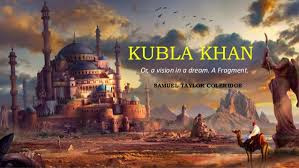KUBLA KHAN – COLERIDGE
KUBLA KHAN – COLERIDGE
·
The poem is composed in a sort of Reverie.
·
The poem was written at Brimstone farm.
·
Imagination is the prominent ingredient of the
poem.
·
The imagination was interrupted by a person from
Porlock.
·
George Gordon Byron published.
·
This poem consists of images.
·
It has two parts. 1. Depicts Palace 2. Depicts poet’s
skills.
·
Who is Kubla khan? A tartor king.
·
What does he want to do? Create an Eden.
·
Kubla khan is often called as A Vision in a
Dream.
·
Kubla Khan is a Mongol ruler, a great Chinese emperor
and founder of the Yuan dynasty.
·
Xanadu is his summer capital.
·
He wants to construct the palace in garden,
which has incense bearing trees.
·
Garden is enclosed with a wall stretched for 10
miles.
·
Kubla Khan meant both Priest and King.
·
The pleasure-dome is a very tall building. The shadow
of dome fell on the waves.
·
Its dome is sunny and the caves under it are
icy.
·
The listener of the poet looks upon him as a
holy being.
·
The poet is divine creature eating the honey-dew
and the nectar which are the food of the gods.
·
The River Alph (referred as the Sacred River)
pours into subterranean sea.
·
The Alph meanders 5 miles across forests and
valleys.
·
The Alph is compared to Delphian oracle
·
In Kubla Khan we saw a Damsel with dulcimer
(musical instrument).
·
The damsel was a Abyssinian maid.
·
The damsel of singing of Mount Abora.
·
Kubla khan hears his ancestral voices warning of
forthcoming war.
·
Coleridge got the idea of Kublakhan as Dejection
ode from Percy’s Reliques of English Poetry.
·
“His flashing eyes, his floating hair weave a
circle round him thrice”- referred Coleridge.
·
Coleridge says that the people who see him will
weave a circle round him thrice.
·
The outstanding feature of the property is a
fountain in a chasm.
·
Coleridge conjures up visions of two kinds of
paradise- on the ‘ stately dome and pleasure garden’ of Kubla Khan, and the
other the Paradise of Mount Abora.
·
The poem was chiefly inspired by opium consuming
dream.
·
It is a fragrant.
·
It is a piece of verbal magic, inspired in a
dream.
·
In 1797 coleridge had been ill, and a drug had
been prescribed to make him sleep. Just before he fell asleep he had been
reading a book about Kubla Khan.
·
Though it was written In 1797 it was not
published until 1816, when in preface Coleridge described it as “ a
psychological curiosity’.






No comments:
Note: only a member of this blog may post a comment.